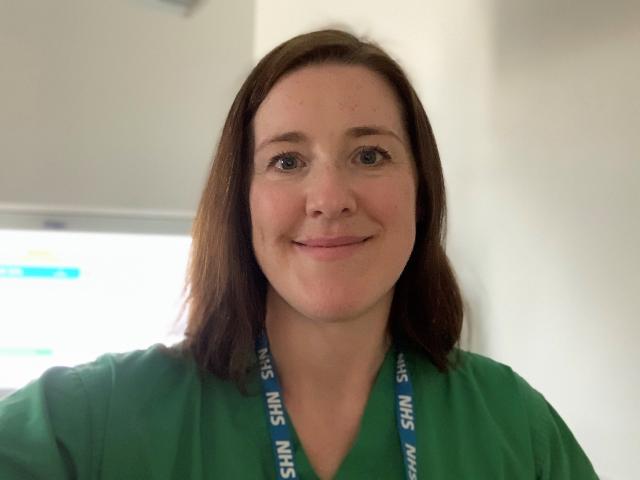
How immersive virtual reality therapy could aid rehabilitation and recovery post-intensive care
19 May
To mark International Clinical Trials Day 2023 (20 May), and our celebration of the outstanding achievements in health and care studies led by Welsh researchers to improve patient treatments and care.
Health and Care Research Wales supports a wide range of research across Wales including the development of new treatments and technology.
One leading example from the Royal Glamorgan Hospital in Llantrisant, Rhondda Cynon Taf, involves the use of immersive virtual reality (VR) therapy to help patients experiencing trauma following treatment in an intensive care unit (ICU).
Dr Ceri Lynch, a Consultant Anaesthetist at the hospital, is exploring how immersive VR could aid some patients in their rehabilitation and recovery, with figures showing that up to 80 per cent of those who are admitted to intensive care experience some degree of post-intensive care syndrome (PICS) – causing both physical and psychological problems.
Dr Lynch said: “People may have physical symptoms like aches, chest pains and shortness of breath. They may have headaches; tiredness and fatigue are also very common.
“There can be psychological problems like anxiety, stress, depression, and problems sleeping. They can also have cognitive issues and problems with concentration.
We work so hard in the ICU to save people's lives. But sometimes when we talk to patients who have survived, they say to us ‘This is no life.’”
Dr Lynch said that patients may find themselves completely dependent on other people to care for them and that they may suffer from post-traumatic stress disorder and distressing flashbacks because of their experience of critical illness.
She added: “The things we do to help them, like putting a breathing tube into their throat, or putting needles under the skin, can be traumatic. Patients find it very difficult to sleep because there are lots of noises, lights and activities going on around them.
“A lot of patients suffer from delirium when they’re very unwell. If they are receiving lots of medication, if they have a temperature or are suffering from a lack of sleep, they can become confused and misinterpret things. They may suffer from hallucinations, which can lead to flashbacks once they are out of intensive care.”
Dr Lynch said that patients mostly asked for a tour of the ICU.
They want to go and see the bed they were in and meet the staff. When they do get a tour and an explanation of everything, it really helps them,” she added.
Dr Lynch – whose study is funded via the Research for Patient and Public Benefit (RfPPB) scheme – said that by developing an immersive VR app, patients could undertake guided meditation and relaxation exercises with support from clinical, physiotherapy and psychological support staff without needing to leave their own home.
She added:
If we’ve managed to get someone through intensive care and they’ve survived, we tend to regard that as a big success. However, survival isn’t enough – we need to make sure that person goes on to have a good quality of life.”
One co-applicant of the research project, Craig Greenstock, experienced PICS after being placed in an induced coma when he contracted COVID-19 in December 2020. He spent two and a half weeks in ICU before he recovered, describing it as ‘an absolute nightmare time’.
Craig, 61, from Pontypridd, is now involved in the study, taking part in structured interviews and focus groups with other patients, as well as testing the immersive VR app from a patient’s perspective.
He added: “I was on a six-bed unit, and I was the only person to come out of that. It was an absolute nightmare time. When I came out, I was getting flashbacks and lots of night terrors.
“Whilst in the ICU, I had two vivid dreams that something was scratching at the back of my throat. As part of other ‘flashbacks’, I still have a recurring dream that I died and I was lying on the ground with everything around me being dark.
“I had other dreams where people were after me and my family, trying to harm them. I've never dreamt like that before. These dreams were very real and quite scary. I would wake up screaming and shouting. I still get the flashbacks now.”
By getting involved in the study, Craig said he wanted to ‘give something back’ to help other patients who may have experienced trauma themselves.
He added:
I'm a very positive person, I wanted to give something back. I'm more than happy to tell other patients and relay my story to give them reassurance for the traumatic experience that they've been through.
“I am interested from the patient’s perspective because I want to help contribute if there is any learning that can come out of my experience. I am working with the research team and supporting them, so that they can take this forward and help more people in the future.”
Dr Nicola Williams, Director of Support and Delivery at Health and Care Research Wales, added:
We are proud to support our research community across Wales on International Clinical Trials Day, and recognise the wonderful work being undertaken to improve patient treatment and care, which is at the heart of everything that we do.”
Health and Care Research Wales is supporting the research community with various funding awards and schemes, and promoting opportunities for people to participate in research.
Sign up now for our weekly bulletin to find out about all the life-saving research happening in Wales.